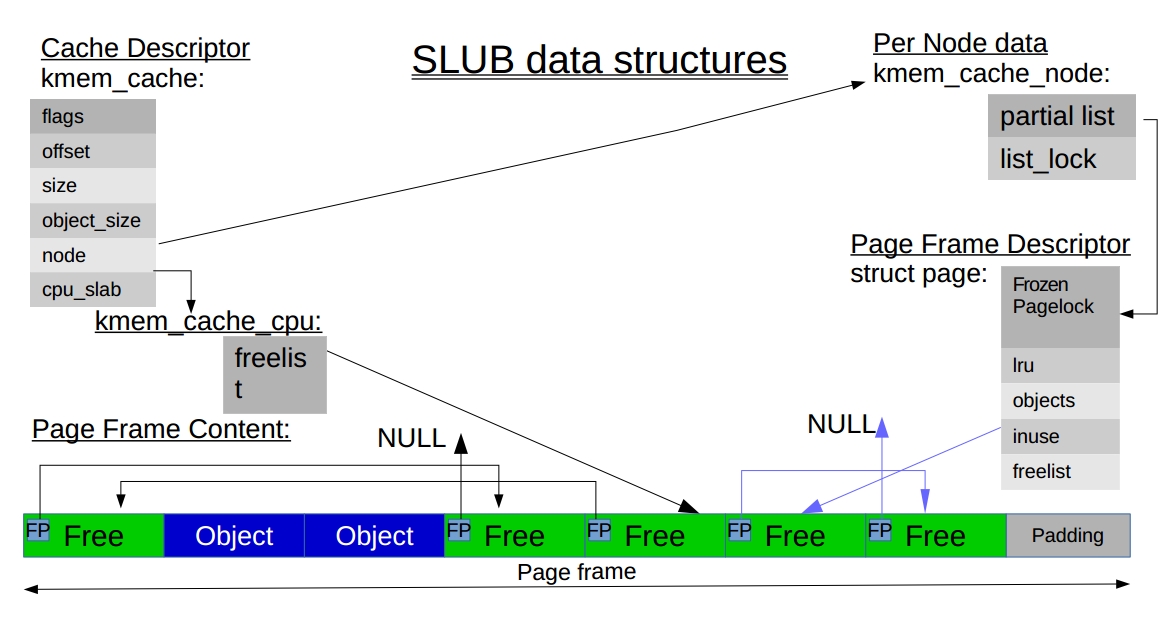SLUB 01:the SLUB allocator的相关数据结构和主要流程
文来自本人旧博客: blog.163.com/awaken_ing/blog/static/1206131972016316114114855
平台 ARM Versatile Express for Cortex-A9 SMP
内核版本 3.10.86 (未定义 CONFIG_NUMA)
1. 概览
The SLUB allocator 相比SLAB, 试图 remove the metadata overhead inside slabs, reduce the number of caches, and so on. The only metadata present in the SLUB allocator is the in-object “next-free-object” pointer, which allows us to link free objects together. struct kmem_cache 的成员 int offset 用来指明 指针在 object 中的偏移量, 这个指针指向的是下一个可用的object. How does the allocator manage to find the first free object? The answer lies in the approach of saving a pointer to such an object inside each page struct associated with the slab page. SLUB allocator 没有SLAB的full list 和 empty list.

图片来自 http://events.linuxfoundation.org/sites/events/files/slides/slaballocators.pdf
linux-3.10.86/mm/slub.c
slab_alloc() -> slab_alloc_node()
slab_alloc_node(struct kmem_cache *s, ...
{
struct kmem_cache_cpu *c=__this_cpu_ptr(s->cpu_slab);
object = c->freelist;
if fastpath {
void *next_object = get_freepointer_safe(s, object);
c->freelist=next_object; //via this_cpu_cmpxchg_double()
}else
...
return object;
}
static inline void *get_freepointer(struct kmem_cache *s, void *object)
{
return *(void **)(object + s->offset);
}
2. 从slowpath看数据结构和流程
slaballocnode()中的slowpath为 _slaballoc().
struct kmem_cache {
struct kmem_cache_cpu __percpu *cpu_slab;
...
struct list_head list; /* List of slab caches */
...
struct kmem_cache_node *node[MAX_NUMNODES];
};
struct kmem_cache_cpu {
void **freelist; /* Pointer to next available object */
...
struct page *page; /* The slab from which we are allocating */
struct page *partial; /* Partially allocated frozen slabs */
...
};
执行slaballoc()这个slowpath的原因是 kmemcache per cpu的freelist的object的单向链表形式的object 已用完 ( kmemcache->cpuslab->freelist == NULL ).
__slab_alloc()中先使用kmemcache per cpu的page的freelist: cpuslab->freelist=cpuslab->page->freelist; cpuslab->page->freelist=NULL;
如果也用完了, 则尝试 cpu_slab->partial及其链表上的page的object.
如果还是没有object, 也就是per cpu上的object都耗光了, 则执行slaballoc()中的newslabobjects():
使用 kmemcachenode->partial->next (指向page的lru)所在的page, 总共有nrpartial个这样的page, 取freelist不为空的page. 这里采取的是批量操作方式, 取出的第一个page划给c->page, 其他page放入cpu partial.
如果也没有, 则执行new_slab(). 如下:
new_slab_objects
|--get_partial
| |--//从struct kmem_cache_node的partial这个双向链表中找, 如果找到, 则划入 c->page和struct kmem_cache_cpu 的page链表 (通过struct page的next)
| |--get_partial_node
|--fallback to new_slab()
| |--allocate_slab
| | |--alloc_slab_page(..., struct kmem_cache的oo) 从buddy system分配, order根据oo来
| | |--fallback to alloc_slab_page(..., struct kmem_cache的min) order根据min来
关于struct kmemcacheorder_objects:
allocate_slab
|--alloc_pages(..., oo_order(oo))
|--page->objects = oo_objects(oo);
成员x的高16bit为order, 低16bit为struct page的unsigned objects.
struct kmemcacheorder_objects { unsigned long x; };
3. 自问自答
问:有些情况下, 一个slabs要占用多个pages, 说说有啥不同?
答: newslab() 从buddy system中分配compound page, 故compound page该有的特征都有, 具体特征见 linux-3.10.86/mm/pagealloc.c:prepnewpage().
compound page中只有head page设置PGSlab, tail pages没有设置PGSlab.
new_slab
{
__SetPageSlab(page)
}
4. 参考资料
https://lwn.net/Articles/229984/
http://events.linuxfoundation.org/sites/events/files/slides/slaballocators.pdf
5. 附SLUB时struct page结构体struct page {
/* First double word block
unsigned long flags;
struct addressspace mapping;
/ Second double word */
struct {
union {
pgofft index; /* Our offset within mapping. /
void *freelist; / slub/slob first free object /
bool pfmemalloc;
};
union {
unsigned counters;
struct {
union {
atomic_t _mapcount;
struct { / SLUB /
unsigned inuse:16;
unsigned objects:15;
unsigned frozen:1;
};
int units; / SLOB /
};
atomic_t _count; / Usage count, see below. /
};
};
}; / end of Second double word /
/ Third double word block /
union {
struct list_head lru;
struct { / slub per cpu partial pages /
struct page *next; / Next partial slab /
short int pages;
short int pobjects;
};
struct list_head list; / slobs list of pages /
struct slab *slab_page; / slab fields /
}; / end of Third double word block /
/ Remainder is not double word aligned /
union {
unsigned long private;
spinlockt ptl;
struct kmemcache *slab_cache; / SL[AU]B: Pointer to slab /
struct page *first_page; / Compound tail pages */
};
...
};
struct page {
/* First double word block
unsigned long flags;
struct addressspace mapping;
/ Second double word */
struct {
union {
pgofft index; /* Our offset within mapping. /
void *freelist; / slub/slob first free object /
bool pfmemalloc;
};
union {
unsigned counters;
struct {
union {
atomic_t _mapcount;
struct { / SLUB /
unsigned inuse:16;
unsigned objects:15;
unsigned frozen:1;
};
int units; / SLOB /
};
atomic_t _count; / Usage count, see below. /
};
};
}; / end of Second double word /
/ Third double word block /
union {
struct list_head lru;
struct { / slub per cpu partial pages /
struct page *next; / Next partial slab /
short int pages;
short int pobjects;
};
struct list_head list; / slobs list of pages /
struct slab *slab_page; / slab fields /
}; / end of Third double word block /
/ Remainder is not double word aligned /
union {
unsigned long private;
spinlockt ptl;
struct kmemcache *slab_cache; / SL[AU]B: Pointer to slab /
struct page *first_page; / Compound tail pages */
};
...
};
本文地址: https://awakening-fong.github.io/posts/mm/slub_slab_alloc
转载请注明出处: https://awakening-fong.github.io
若无法评论, 请打开JavaScript, 并通过proxy.
blog comments powered by Disqus